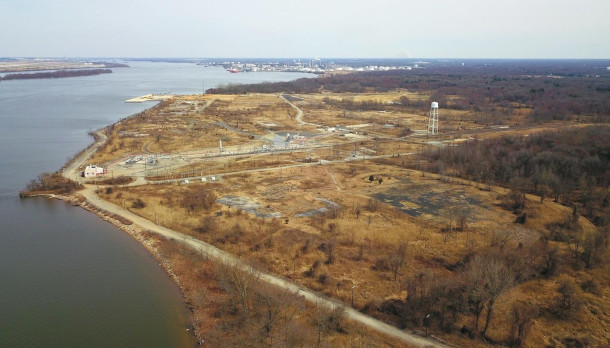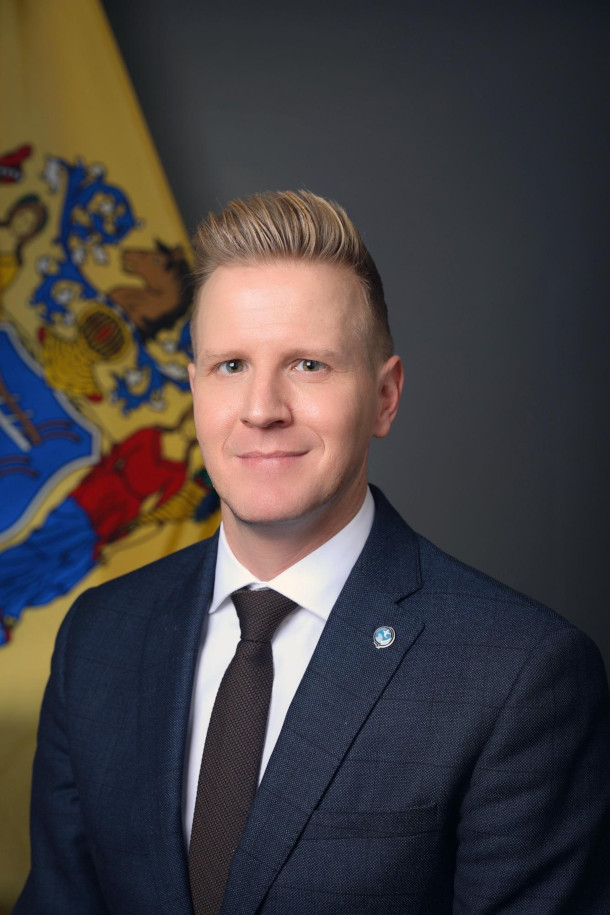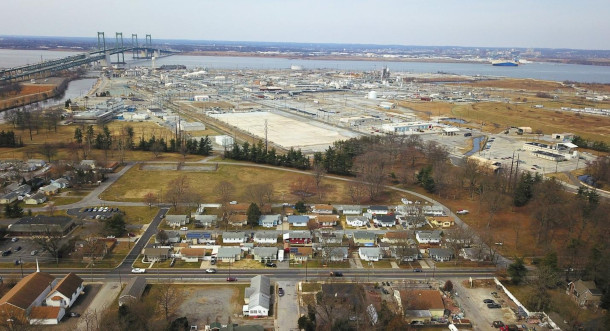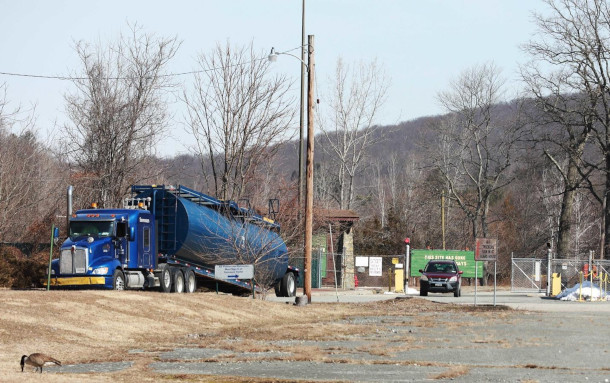PFAS Polluters Pay Up
Air Date: Week of September 5, 2025

The Repauno Port & Rail Terminal was once a DuPont chemical manufacturing facility. The land is being cleaned up for PFAS contamination attributed to DuPont and its spinoff, Chemours. The site is currently being operated as a port facility by FTAI Instructure Inc., which acquired the property in 2016. DuPont and its subsidiaries have agreed to spend $1.2 billion for the cleanup of various sites across the state. (Photo: Office of the NJ Attorney General)
New Jersey officials are calling its $2 billion settlement with major manufacturers of PFAS “forever chemicals” the largest environmental settlement ever won by a state. Shawn LaTourette, New Jersey’s Department of Environmental Protection Commissioner, discusses with Host Paloma Beltran the legacy of industrial contamination in the state and how the settlement is expected to pay for cleanup as well as restoration of degraded ecosystems.
Transcript
DOERING: From PRX and the Jennifer and Ted Stanley Studios at the University of Massachusetts, Boston, this is Living on Earth. I’m Jenni Doering.
BELTRAN: And I’m Paloma Beltran.
Our first story today is about a major victory for the state of New Jersey over PFAS contamination. As you know Jenni, those are so-called “forever chemicals” that are found in everything from rain jackets, to firefighting foam, to nonstick cookware.
DOERING: That’s right, and they’ve now spread throughout our environment and our bodies. You know, I’ve been thinking a lot about PFAS since we know these chemicals are linked to numerous health problems – cancer, hormonal imbalances, and weakened immunity. And this weekend I finally decided to retire the last two nonstick pans I own. So I’m committing fully to stainless steel and cast iron cookware.
BELTRAN: Hey, that’s a big step! I made the switch a year ago, but it just takes a little more elbow grease to clean those up. But you know Jenni, I’ve realized that hot water and vinegar act like magic when it comes to cleaning stainless steel.
DOERING: Ooh, that’s a great tip!
BELTRAN: Yeah, please try it! And, you know, I haven’t quite mastered the do’s and don’ts of cooking with cast iron, but I believe in us Jenni!
DOERING: You know what, I love that spirit! You’re giving me a lot of hope for moving past the PFAS in cookware. Anyway, I guess when it comes to PFAS there are much bigger fish to fry than a couple of frying pans. And this settlement New Jersey reached with chemical manufacturers is a really big deal, huh?
BELTRAN: It’s huge, we’re talking about $2 billion, and officials say it’s the largest environmental settlement ever won by a state. DuPont, its spinoff Chemours, and Corteva have to pay the state $875 million to settle claims and provide up to $1.2 billion in cleanup costs. New Jersey has won other PFAS settlements in the past. But for this latest settlement, a public comment period runs through November 1st and a court will need to give final approval. Joining us now to discuss is Shawn LaTourette, the state Department of Environmental Protection Commissioner. Welcome to Living on Earth, Shawn!

New Jersey Department of Environmental Protection Commissioner Shawn M. LaTourette was appointed on June 14, 2021. A lawyer and a policymaker with more than two decades of experience, LaTourette began his career defending victims of toxic exposure, including organizing and advocating for the needs of vulnerable New Jersey communities whose drinking water was contaminated by petrochemicals. (Photo: New Jersey Department of Environmental Protection)
LATOURETTE: It's a pleasure to be with you.
BELTRAN: Tell us more about the contamination here. You know, how did PFAS exposure impact the residents of New Jersey?
LATOURETTE: So New Jersey is home, or rather, was home to a bit of a PFAS manufacturing epicenter in the United States, particularly in the southern half of the state. There were several facilities, DuPont being one of them, but there were also other manufacturers located in factories along the Delaware River in southern New Jersey and also along the Raritan River in Bay in central New Jersey, and we began understanding the existence of PFAS contamination in the early to mid 2000s. In fact, New Jersey conducted the first statewide assessment of PFAS affecting water, I believe, in the country, in about 2006 and that sampling of water systems led us to begin expanding our own groundwater monitoring networks for PFAS sampling, and we began to test for the occurrence of certain PFAS compounds in various media, including in soils and including in biota and in shellfish, for example. And we came to find that New Jersey is in many ways, ground zero for some of the worst impacts of PFAS due to that manufacturing history. And one example of that would be the case that went to trial was the first one that went to trial against DuPont. It was concerning a site called the chambers works in southern New Jersey. It is a site that is over 1,300 acres. It's the size of a small town, and it sits at the foot of the Delaware Memorial bridge that connects New Jersey to the state of Delaware, goes over the Delaware River. And DuPont operated that site for a long, long time. They produced chemicals like Teflon, for example, and many other chemicals. And at that site, they had a large wastewater treatment plant, and they sent, DuPont, that is, sent their PFAS waste from elsewhere in the country, from other factories in West Virginia and North Carolina, et cetera. They sent their PFAS waste to be disposed of through the wastewater plant at chambers works. In effect, DuPont used the state of New Jersey as the PFAS toilet for the country. And so we find this contamination all over South Jersey, and of course, in other places as well. We find PFAS contamination in places you wouldn't expect, like in the surficial soils of remote New Jersey forests that should be pristine.
BELTRAN: Shawn, PFAS is deemed a forever chemical. It's pretty ubiquitous. What will the restoration process entail?

Chambers Works is a 1,455-acre complex located along the eastern shore of the Delaware River by State Highway 130 (Shell Road) in Deepwater, New Jersey. East of the Chambers Works Complex are industrial, residential, and recreational areas. North of the complex are residential areas, with the Delaware River to the west. (Photo: Office of the NJ Attorney General)
LATOURETTE: It's a lot more complicated than some of our traditional chemicals. New Jersey was once, less so now, a state pretty dense with chemical manufacturers, and we have a long history of making sure they clean up after themselves. But PFAS isn't like petroleum hydrocarbons or, or metals or PCBs, because they circulate so widely throughout environmental media. And so we have to go through a process where we are identifying the major sources of PFAS and interrupting them from becoming continuing sources to another part of whether it's the water cycle or the carbon cycle. I'll give you an example. If a company is still making things with some types of PFAS, and they discharge their wastewater through a treatment plant, and that goes into the waterway, that PFAS is now circulating through the waterway, and it's going to get picked up by a drinking water system, and then that drinking water system is going to have to pay to put on treatment to clean that PFAS out. But what if we catch it before it gets to the waterway and we interrupt the PFAS loading at that point in the water cycle? We've got to do this type of work at multiple points within the water cycle, within the carbon cycle, so on and so forth. We've got to do things like putting in sentinel wells around some of our oldest landfills that could be leaching PFAS that is then reaching the water table, which is also a source of drinking water.
BELTRAN: And from what I understand, this settlement provides money for natural resource restoration. What does that mean? You know, what will that process look like?
LATOURETTE: Natural resource restoration is different than cleanup. Natural resource restoration is based in a really simple principle, a principle of trusteeship, meaning, not unlike your 401k, right, or your investment accounts that a bank is holding for you in trust, and they have to take good care of it, the state government holds all of the natural resources in trust for the people, and if they're harmed, we have to pursue, we are obligated to pursue those who harmed the resources to pay, to clean, not just clean them up, but to restore the value of those resources. So if pollution degrades a wetland, we need to make you create a new wetland that provides those same natural resource benefits for the public, because it's the public's resource right, our air, our land, our water, our wetlands, our natural and historic resources. They don't belong to the government. They belong directly to the people, and it's just the job of folks like me to take good care of them, and if they're hurt, it's the obligation of the natural resource trustee to get your resources back.
BELTRAN: You know, Sean, this seems like a turning point for PFAS accountability. What can other states learn from New Jersey?
LATOURETTE: I think what other states can learn is not something they don't already know. Other states that have been impacted by PFAS to the extent New Jersey has, and there are other states that have experienced such impacts. North Carolina, West Virginia, Minnesota, right the list goes on, particularly where there were industrial sites, you're going to see those impacts be worse. So there's a lesson for the states that have had a history of industrial PFAS manufacturing, but there's also a lesson for states that didn't have that industrial history, but still have a perpetuating PFAS problem, because it is diffuse within our environment. And in each of those instances there is an important lesson that comes out of this, which is number one, the public expects what my grandmother did. And by that, I mean the public expects of their government—our department of environmental quality or protection—the public expects their government to hold folks accountable to ensure that they clean up after themselves and that the public will support you if you have to take on a big company to make them follow my grandmother's rule, to clean up after themselves. And the other lesson, I think, is that these companies, who know they have these liabilities, they will come to the table. You may have to fight with them for a few years and go through a little bit of litigation, but the science is clear. The stuff is harmful, and they knew it was harmful, and they kept making it anyway, and they kept putting it in products anyway, because the getting was just too good.

E.I. DuPont De Nemours & Company manufactured explosives at the 576-acre site in Pompton Lakes, New Jersey from 1902-1994, when it closed. DuPont manufactured lead azide, aluminum, bronze shelled blasting caps and produced metal wires and aluminum and copper shells. (Photo: Office of the NJ Attorney General)
BELTRAN: And how will the people of New Jersey benefit from this decision? How will they benefit from this settlement?
LATOURETTE: Well, they're going to have cleaner water, that's for sure. And one of the points that's really important about that. I think about small rural communities where people are not connected to a public water system, and how we have aquifers here in New Jersey and around the country that are contaminated with PFAS above safety standards, many of them don't know, right? There's no government entity in many instances, unless you're selling your house, coming to test your water for you, if you have a private well, but you can and should test it yourself, and you should do it every year. I think that for those communities in particular, there's a new resource for them that didn't exist before at all. Public water systems, they've always had access to funding from the federal and state governments to improve their drinking water treatment. But potable well owners represent 15% of New Jersey. They don't have that level of support, and this means they'll get it. So we're taking care of folks who've been forgotten, maybe even written off. And we're not just going to make sure the water is clean. We're going to enrich their environment, whether that is new rain gardens in their community that help absorb pollutants instead of circulate them, whether it's making sure that old landfill in your town that nobody ever checked to make sure it was closed right, make sure it's not leaching into your waterway. I think there's a lot of positive impacts that will play out over several years coming from this, but at the same time, the PFAS liabilities are large, and they are forever chemicals and new treatment that gets built because of this settlement will have to be operated into the long term. This settlement won't fix everything, but it gives us one heck of a big head start.
BELTRAN: Shawn LaTourette is Commissioner of the New Jersey Department of Environmental Protection. Thanks for joining us.
LATOURETTE: It's a pleasure. Thank you.
Links
Read the Statement from the New Jersey Department of Environmental Protection
Living on Earth wants to hear from you!
Living on Earth
62 Calef Highway, Suite 212
Lee, NH 03861
Telephone: 617-287-4121
E-mail: comments@loe.org
Newsletter [Click here]
Donate to Living on Earth!
Living on Earth is an independent media program and relies entirely on contributions from listeners and institutions supporting public service. Please donate now to preserve an independent environmental voice.
NewsletterLiving on Earth offers a weekly delivery of the show's rundown to your mailbox. Sign up for our newsletter today!
 Sailors For The Sea: Be the change you want to sea.
Sailors For The Sea: Be the change you want to sea.
 The Grantham Foundation for the Protection of the Environment: Committed to protecting and improving the health of the global environment.
The Grantham Foundation for the Protection of the Environment: Committed to protecting and improving the health of the global environment.
 Contribute to Living on Earth and receive, as our gift to you, an archival print of one of Mark Seth Lender's extraordinary wildlife photographs. Follow the link to see Mark's current collection of photographs.
Contribute to Living on Earth and receive, as our gift to you, an archival print of one of Mark Seth Lender's extraordinary wildlife photographs. Follow the link to see Mark's current collection of photographs.
 Buy a signed copy of Mark Seth Lender's book Smeagull the Seagull & support Living on Earth
Buy a signed copy of Mark Seth Lender's book Smeagull the Seagull & support Living on Earth

